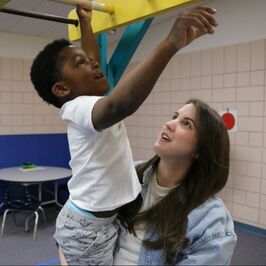|
A Chance To Grow is a special place for many reasons, not the least of which is our Turnquist Child Enrichment Center, that primarily serves young families that require county assistance to receive childcare services.
Turnquist consists of age-specific rooms for infants, toddlers and on up to preschool age. In addition to implementing a developmentally appropriate curriculum, Turnquist teachers are responsible for completing developmental assessments for each child every two months. “Most times, we [the teachers] are the first to notice any social, verbal or motor skill issues,” says Sami, an infant room teacher of three years. “If a child isn’t meeting certain developmental milestones, we notify the parents that we’ve identified an issue and recommend they be referred to our Clinics team. Parents are almost always OK with an observation, and quite often say that they’ve seen the same issues at home, but didn’t know how to address them.” Depending on the nature of the referral, an Occupational Therapist (OT) or Speech-Language Pathologist (SLP) will observe the child in their classroom, alongside the Turnquist teacher. This provides a safe, familiar space for the child, and allows our therapists and teachers the opportunity to discuss whether evaluation and treatment would best address the child’s needs. Once an evaluation is complete and a care plan is established, a child will receive 1-3 therapy sessions per week, with the teacher available to receive additional instructions from the therapist about ways to continue the treatment. The teacher also serves as the intermediary between therapist and parent, providing progress reports and suggestions for therapy at home. “Working with the therapists is really nice,” says Sami, “especially when they show us how to do certain techniques. It makes a big difference that the teachers know how to help them, not just the therapists, because that means the child is getting the therapies they need all day, not just during one or two sessions. Parents really appreciate the convenience, they don’t have to take time out of their work days and it makes their lives a lot easier.” Michelle Koyama, MA OTR/L, ACTG’s Assistant Director of Clinical Services, knows that this process is only possible with great communication from everyone involved. “Normally, these families wouldn’t have access to additional therapies, but we’re able to take that barrier away because we are able to fluidly communicate with the teachers in Turnquist,” she says. “We have a shared philosophy and see things through a developmental and trauma-informed model. We’re on the same page so it makes our communication very easy.” Presently, 20 out of 32 children at Turnquist are receiving OT or SLP services. The need for these services has grown substantially in the wake of the COVID pandemic, and has often led to other areas of concern, including vision and auditory issues. Luckily, we offer vision and hearing screenings as well, and give parents the option to allow their child’s Turnquist teacher to represent their child in the exam room. Not only does this allow for the most optimal treatment schedule for the child (and parent), it provides our doctors with additional insight into their development, because they’re hearing it directly from the person that interacts with them in the early learning setting. “During the pandemic, seeing became flat,” says ACTG’s Optometrist, Dr. Shelby May, OD. “The world got small and children of all ages stayed in the same loop. They didn’t go to the grocery store, take vacations or have other novel experiences. The world wasn’t big enough for these children to grow properly, and we’ve seen milestone delay amplify.” From infants unable to hold their heads up (motor skills), to toddlers throwing tantrums (self-regulation), and preschoolers unwilling to give up screen time (attention), the effects of COVID are everywhere. The therapists and teachers at ACTG, however, are uniquely prepared to help these children. “Early intervention is so important,” says Sophie Reynolds, MS, OTR/L. “It’s really cool that our clinic is able to intervene at such early ages, where change can be made quickly because we can get to them so soon.” Dr. May sees several Turnquist children in her clinic, and despite the difficult environmental factors, she says that she’s now starting to see a rebound effect. “Kids are picking back up really fast. If we give them the right tools, all those skills come back. Their brains didn’t change, they always had the capability, they were just missing the experience - we have to give them the right stimulus to grow.”
Shania said that Larico had been to other daycares, but they didn’t provide the type of communication, support or sense of community that she wanted. “Now when they wake up, they’re both excited to go to school and to see their teachers and therapists. They really love it here, and I do too.”
The Turnquist Child Enrichment Center and Clinical Services are amazing resources for young parents striving to provide the best foundation for their children. But more importantly, the community that our teachers and therapists cultivate is what sets A Chance To Grow apart from any other daycare, school or clinic in the Twin Cities. “My kids wouldn’t be where they are today without the Turnquist teachers and the other services. It’s great that everything and everyone is in one building,” says Shania. “You can’t find a place like this anywhere else.” >> Click here to be redirected back to ACTG's Winter Newsletter
0 Comments
Rosa* had plans – to go to college, major in business, build a career – but all that changed when she found out she was pregnant. She dropped out of high school and found herself drifting, living sometimes with her parents, sometimes with her boyfriend, who is the father of her baby. When little Rodrigo was born, she became a stay-at-home mom.
This past summer, as her baby approached his first birthday, Rosa found out about the TCEC Teen Parents Program and realized that, through this resource, she had an opportunity to get her life back on track. It provided her with a safe place for her son to stay while she took the steps she needed to take, a place that was not only secure but would also provide a great learning experience for him. Turnquist’s infant and toddler programs ensure that even the littlest ones get the developmental support they need to grow up strong and ready for school. With access to reliable transportation, Rosa can turn her life around, because she can get her son to childcare and herself to school on time. Now she attends the Minneapolis Community and Technical College five days a week, three hours a day. This is hugely important to young moms like Rosa. Without childcare and transportation support, teen mothers face formidable obstacles. According to the Minneapolis Department of Health and Family Support, only 50% of teen mothers get their GED by age 22, and less than 2% of teen parents graduate from college by the age of 30. According to a 2014 Hennepin County study, only 32% of county-involved teen parents go on to graduate from high school and dropout rate is among the highest in the state. Children of teen parents are more likely to:
“I am so happy I found this fantastic program,” she says. “The staff is caring and they always listen.” She is so grateful to have this invaluable resource. Without it, she might not have been able to reach her goals. *Names are changed to protect privacy  Jillian had just entered high school when she learned that she was going to be a mother. At 14, she was overwhelmed at the idea of being a single parent. She told herself, “I’m going to stay in school. I’m going to get this done.” She attended classes for a few months, but a complicated pregnancy and unstable living situation made it nearly impossible to focus on her studies. Like so many teen parents, she had to drop out to care for herself and her child. Her son, Kaiden, was born prematurely. The doctors warned Jillian that he may not survive. He had a feeding tube and required a lot of attention, making it even more difficult for Jillian to plan for their future. One month after Kaiden’s birth, his health had stabilized and Jillian returned to school. It was hard for her to focus while away from her baby, and she would often leave in the middle of the day to be with him. It was during her sophomore year that Jillian, now 15 and mother of a three-month-old, found out she was pregnant again. Nine months and another difficult pregnancy later, she gave birth to her second son, Khail. They all moved in with Khail’s father and Jillian once again attempted a return to school. She endured emotional abuse and battled depression and anxiety, both at home and in the classroom. Now with two children under the age of two and another father who wasn’t fulfilling his responsibilities, she was again forced to drop out in what would have been her junior year. “With two of them so close in age, not having much help, and not having anyone to watch them, I didn’t have time for school,” said Jillian. Soon after, a 16-year-old Jillian packed up her boys and moved back in with her parents. For the next two years, Jillian bounced from job to job. She wanted to provide for her children and didn’t want any help from the boys’ fathers, but the demands of working and parenting were difficult. Without a driver’s license, transportation was always an obstacle. Her parents helped when they could, but were adamant that Jillian return to school and earn her GED. Determined to find a solution, Jillian filed for daycare assistance through the Minnesota Family Investment Program; a service helping low-income families with children meet basic needs, while helping parents move to financial stability. She was referred to the Minnesota Visiting Nurses Association (a partner of A Chance To Grow) where she learned about the 4-star Parent Aware rated Turnquist Child Enrichment Center. After touring the center and learning about ACTG’s Teen Parent and Transportation program, Jillian, now 19, was excited for the opportunity to return to school. She would finally be able to focus on her education with the peace of mind that her children would be cared for in a safe and accredited childcare center. “I started at Minneapolis Community Technical College last September and my boys started at Turnquist the same day! It’s made my life easier,” she said, “I’m improving myself and making sure I can build a good future for them.” Her boys love the program, too. Prior to Turnquist, Khail had difficulty socializing with other children and had attachment issues. Now, nearly a year later, he has lots of friends and looks forward to going to school, in part to the S.M.A.R.T. approach (Stimulating Maturity through Accelerated Readiness Training) practiced at the center. “Turnquist’s staff genuinely love the kids and the children love their teachers,” she said. “They also have helpful resources to us younger parents. Other schools don’t care to help out the family as a unit like Turnquist.” With her children being cared for and her home life stabilizing, Jillian was able to focus on her education and on April 17, 2018, she earned her GED. Shortly thereafter, she participated in an internship program at Hennepin County Medical Center and is now exploring courses to pursue a bachelor’s degree in Medical Management, where she hopes to begin a career as a nursing assistant and cosmetologist. “This program has helped me improve my life by allowing me to go back to school, graduate, get a good internship opportunity, and help me do what I need to while knowing my children are safe and being taken care of,” she said. “Turnquist and ACTG’s Teen Parent Program provides comfort to my kids and to me. It’s their second home where they know they’re safe and loved.” |
success story category:
All
WE LOVE HEARING FROM YOU! |


